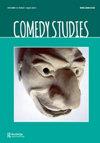‘Shipwrecked by the laughter of the gods’: Henri Bergson’s theory of comedy and the meaning of life
Q1 Arts and Humanities
引用次数: 0
Abstract
Abstract This paper argues that comedy is the essence of the human condition. In setting out my case I draw on the work of French process philosopher, Henri Bergson. Here I present an exploration of Bergson’s work showing how his theory of comedy, set out in Laughter (1900), influenced his later writings, notably Creative Evolution (1907). In Laughter, Bergson explores the social purpose of laughter and argues that it is ‘rigidity’ that in all cases brings about our downfall and gives rise to laughter as a social corrective. This is expressed in his famous apothegm ‘something mechanical encrusted on the living’. Here I show how these ideas are relevant to a central theme of Creative Evolution, the development of human intelligence. Though intelligence, through invention, fits us to our environment it results in what Bergson calls a ‘mechanistic habit of mind’ which produces irony as the fundamental human condition.“被众神的笑声毁了船”:亨利·柏格森关于喜剧和生命意义的理论
摘要本文认为,喜剧是人类生存状态的本质。在阐述我的观点时,我借鉴了法国过程哲学家亨利·柏格森的著作。在这里,我对柏格森的作品进行了探索,展示了他在《笑》(1900)中提出的喜剧理论是如何影响他后来的作品的,尤其是《创造性进化》(1907)。在《笑》一书中,柏格森探讨了笑的社会目的,并认为正是“刚性”在所有情况下都会导致我们的堕落,并使笑成为一种社会矫正。这一点在他著名的格言“某种机械镶嵌在活人身上的东西”中得到了表达。在这里,我展示了这些想法是如何与创造性进化的一个中心主题——人类智慧的发展——相关的。尽管通过发明,智力使我们适应了我们的环境,但它导致了柏格森所说的“机械思维习惯”,这种习惯将讽刺作为人类的基本条件。
本文章由计算机程序翻译,如有差异,请以英文原文为准。
求助全文
约1分钟内获得全文
求助全文
来源期刊

Comedy Studies
Arts and Humanities-Literature and Literary Theory
CiteScore
0.60
自引率
0.00%
发文量
26
 求助内容:
求助内容: 应助结果提醒方式:
应助结果提醒方式:


